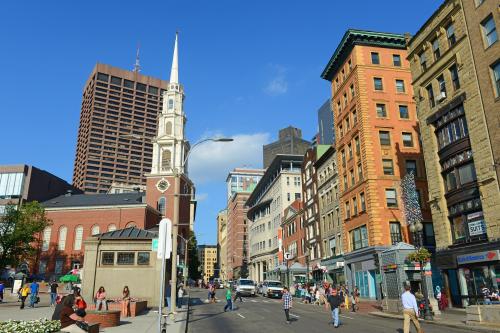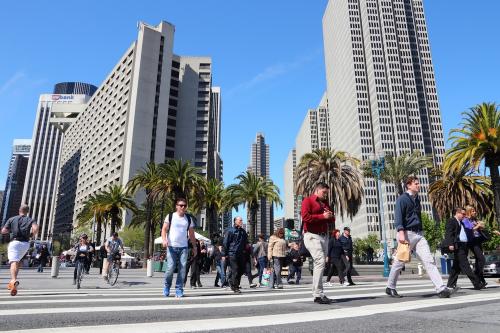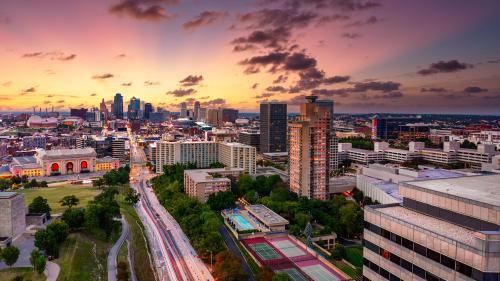This article was originally published on City Lab.
The mayors are coming. In recent months, City Hall occupants in Tallahassee, Nashville, and Tuscaloosa have won Democratic primaries for their state’s gubernatorial races. Mayor Eric Garcetti of Los Angeles, former New Orleans Mayor Mitch Landrieu, and former San Antonio Mayor Julian Castro are rumored to be considering White House bids in 2020. City leaders seeking higher office are banking on the idea that voters will respond to what cities embody today: innovation, diversity, and progress.
In the Age of Trump, some experts have been urging cities to declare independence from the federal-level chaos in Washington. Others herald local power and local actions as antidotes to national dysfunction. Across the country, corporations and philanthropies are pouring millions of dollars into city initiatives, attracted by the notion that solutions in urban areas—on issues like economic development, clean energy, and resilience—might bubble up to the national level.
I understand the impulse. From the perch of a national think tank on cities, I see cities mounting promising responses to big problems like climate change, housing affordability, and criminal justice. At the Brookings Institution, we help local and regional leaders accelerate solutions to global competitiveness and shared prosperity.
But city boosterism can also go too far: Urging city leaders to go it alone celebrates a deep dysfunction in federalism—and it normalizes a self-destructive shift in politics and governance.
For instance, the Trump administration is using the narrative of increased local capacity to justify draconian cuts to federal support for cities, from transit programs, community development financing, to the entire Economic Development Administration. The president’s 2019 budget notes that it “…recognizes a greater role for state and local governments and the private sector to address community and economic development needs,” signaling abdication of a longstanding federal role in those areas.
Further, federal policies do matter, whether city leaders like it or not. Federal deportation forces are striking fear into city and suburban immigrant communities. The new tax law imposes a limit on state and local tax deductions, making it more economically and politically costly for city governments to raise revenue. Tariffs are threatening companies and jobs across all kinds of communities but the Trump administration proposes to protect farmers from those effects with billions of dollars in subsidies provided by urban and suburban taxpayers. City-by-city actions can’t overcome national policies that broadly undermine urban America.
And as Sherrilyn Ifill of the NAACP Legal Defense Fund has observed, extolling the virtues of localism papers over the dark history of “local control” in America, where deference to local decision-makers has yielded persistent racial segregation and the active suppression of minority voting rights. “We should not romanticize localism,” Ifill wrote, responding to the recent New York Times column on “The Localist Revolution” by David Brooks. “It has often been brutish, oppressive & violent.”
Cities, however, are ultimately creatures of the state. And state policies and programs too often constrain rather than advance local progress.
This probably isn’t what city boosters have in mind. We need a different narrative, one that promotes an effective partnership between all levels of government, but builds explicitly from bottom-up initiative and know-how.
It starts in cities, where localism advocates rightly observe that local leaders must be on the front lines of preparing their workers and businesses for the demands of the modern economy. They must overhaul fragmented, legacy functions like economic development and workforce development into modern strategies that embrace talent as the key to growth. They must also dismantle locally created barriers to wealth creation for communities of color arising from residential segregation, inadequate transportation, and lack of access to capital and social networks for minority entrepreneurs.
Cities, however, are ultimately creatures of the state. And state policies and programs too often constrain rather than advance local progress. In Texas, a highly urbanized state, the governor and state legislators are limiting local capacity to raise revenue and take action to protect the environment or uphold immigrant rights. Instead of this kind of preemption, states should treat cities as partners in creating good jobs and safe, affordable communities, as metropolitan success generates state revenues that support smaller communities statewide. To that end, states should design policies that offer greater flexibility for local actors.
Flexibility can come in many forms: In Georgia, for example, Republican Governor Nathan Deal signed legislation that authorized the city of Atlanta to seek voter approval for a sales tax increase to dramatically expand its public transit system (the measure passed). In California, a new paid sick leave law enables localities to raise benefits above the state baseline.
The federal government, for its part, must recognize that promoting a collaborative partnership with states and localities doesn’t mean just shifting responsibilities downward. Providing an adequate safety net, supporting workers and communities facing sudden job loss, funding basic research, and ensuring a fair census and other data—only a national government can perform functions like these that ultimately enable local initiatives.
This November, voters will go to the ballot box to choose new governors, state legislators, and members of Congress. It’s time to reset the federal, state, and local dynamic. While cities alone can’t save us, they can be the foundation on which we build a restored democracy.
The Brookings Institution is committed to quality, independence, and impact.
We are supported by a diverse array of funders. In line with our values and policies, each Brookings publication represents the sole views of its author(s).







Commentary
The limits of city power in the age of Trump
September 21, 2018